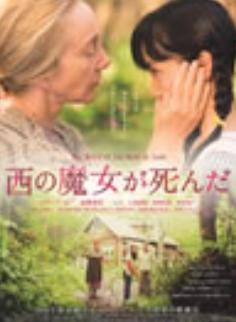
THE WITCH OF THE WEST IS DEAD
Japan, 2008, 116 minutes, Colour.
Sachi Parker, Mayu Takahashi.
Directed by Shunichi Nagasaki.
The Witch of the West is Dead seems an odd translation for a Japanese film – although there is reference to the witches of The Wizard of Oz.
However, witch in this context means a genial sage, personified by the grandmother in the film (played by Shirley Mac Laine’s daughter Sachi Parker).
The film focuses on a fourteen-year-old girl who is unable to stay at school because of pressure against her from cliques of students. She cannot communicate with her mother, a career woman, and her father who lives apart. She goes for a summer to stay with her grandmother, experiencing nature in the countryside, listening to her grandmother’s wisdom, encountering the people who live outside the cities. She takes a set against one man which leads to a climax and a confrontation with her grandmother about kindness and consideration.
The film is beautiful to look at but is extremely slow-moving. Clips would be very helpful for girls of this age to ponder the questions that they ask. Significantly there is a long sequence where granddaughter and grandmother discuss the nature of body and soul, the nature of death, afterlife. There is also a strong discussion between them about control, consideration for others.
The film is more of a festival type of film – and the slow and measured pace may make it difficult for the audience which is its target to watch.
1.The film based on a children’s novel? The target audience, girls, their parents, teachers?
2.The pace, slow, measured? Visual beauty, verbal strength? The body language of the characters? The communication of a child’s world and perspective?
3.The Japanese setting, the house, the woods, rugged beauty? The musical score?
4.The title, witches in Japan, the sage woman, the reference to The Wizard of Oz, the final caption from the grandmother, the sign of the afterlife and her voice?
5.The introduction to Mai, her voice-over, explanation of the situation, travelling with her mother, her mother weeping, going to the grandmother, her telling the story?
6.The flashback to Mai’s stay with her grandmother: her age, her parents separated, her loving both parents, not wanting to go to school, the later explanation to her grandmother about the cliques and her exclusion? Her love for her grandmother, her room, the bond between them, sharing, feeling loved? Their discussions, wisdom, the nature of the witch and her control? The work, vegetables, flowers, the garden, the chickens? The postman and the other people who arrive and are living nearby? Isolated? Genzi and her dislike of him, his reticence? Her discovering her sanctuary, feeling that he had intruded? Her development over the months, the reflective talk, the issues of body and soul, experience, death? Her outburst against Genzi, her temper? Assessing her grandmother’s lack of control, the slap? Her father’s visit, leaving with him, refusing to respond to her grandmother? Two years later, her realisation of how she had behaved?
7.The grandmother, the English background, her story, teaching in Japan, marrying the grandfather, teacher and geologist? Her age, widow, wisdom? Living alone, the dowdy clothes, the cooking, preserving the fruit, the gardens, the chickens? Her kindness towards Genzi? Her love for her daughter? The good advice for Mai, her reactions, patience, the issue of souls, witches? Her final message?
8.The mother, her life, career, separated from her husband, the father, his coming to get Mai? The return and the mother’s grief at her mother’s death?
9.Genzi, simple, the kindliness of the grandmother, his going into the sanctuary, Mai’s dislike and anger with him? At the grandmother’s death, his courtesy towards her, his offering to help Mai?
10.Themes of death, traditions, grief? The final message and hope?